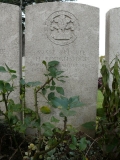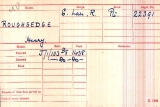Retour aux résultats
Détails victime
Informations personnelles
- ROUGHSEDGE
- H
- HENRY
- Prescot
- Lancashire
-
Son of Thomas Henry and Sarah Agnes Roughsedge, of Tunnel Top, Dutton, Preston Brook, Warrington, Lancs.
Two brothers and four sisters. - Clerk for the Prescot Board of Guardians
Données militaires
- St Helens, 8th April 1916
- 22391
- Private
- British, Victory
- 11th Bn. South Lancashire Regiment
- Pioneers
- 30th Division
- B.E.F.
- He was immediately assigned to the Army Reserve and it was not until 19th April 1916 that he was posted to the 13th Battalion of the South Lancashire Regiment. Henry was sentenced to 5 days "Confined to Barracks" on 27th July 1916 for having "Dirty Entrenching Shafts on Parade". After his initial training, he went to France on 27th August 1916, still with the 13th Battalion of the regiment. Then on 5th September 1916, he was tranferred to the strength of the 11th Battalion of the regiment. Ultimately, in May 1917 the Battalion moved to Palace Camp, near Dickebusch in Flanders. They were now in the infamous Ypres Salient. Although their main tasks were the construction of roads and light railways, they were involved in the construction of fire trenches, and in fact were tasked with this on their first night in the line. The battalion was based in a school to the east of Ypres in an area know to be “an unhealthy spot”. They stayed there until 13th June when severe casualties were caused by salvoes of high explosives and gas shells. They moved on the 14th to new dugouts on the railway embankment, but these were under fire just as much as the school. In June, casualties were 2 officers and 17 other ranks killed, with 3 officers and 126 other ranks wounded. Almost all of the casualties were incurred whilst in their billets, which illustrates how dangerous it was, even out of the front line.In July, the battalion were heavily involved in preparations for the forthcoming offensive, which came to be know as the Third Battle of Ypres. More commonly, it is known as Passchendaele. Much of the battalion’s work was on the communications systems, and they were heavily attacked by German artillery. Over the course of the month, they lost 2 officers and 8 other ranks killed, including Private Roughsedge, and 2 officers and 91 other ranks wounded.
Décès
- 13 July 1917
- Died of gunshot wound to the back, penetrating abdomen, in n°3 Can CCS
- 14 July 1917
- 35
- XVI - B - 9A
Media













